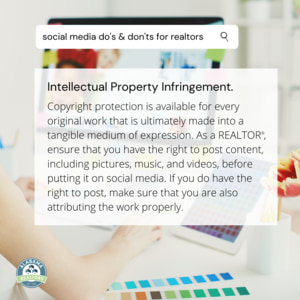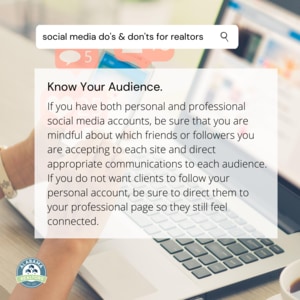
Social Media Do’s & Don’ts for REALTORS®
July 28, 2020
While all businesses can benefit from social media, the importance of an active social media presence for REALTORS® is growing at a rapid pace. It’s no surprise that REALTORS® already acknowledge that social media is an integral part of their marketing and communication strategies to reach clients, family, and friends. In fact, a 2018 NAR study revealed that 77% of real estate professionals rely on social media for their business. As the social media landscape evolves, the rewards are rising, but so are the risks. You should be aware of these concerns as you create content for public view. Take the below risks into consideration, and remember that you are representing yourself, your broker, and the entire REALTOR® community.
What are the legal risks?
Code of Ethics: As REALTORS®, you are subject to the Code of Ethics, which also applies to anything you post online. Note especially, Article 12 of the Code of Ethics that requires you to be truthful in advertising and disclose your status as a real estate professional.
Harassment: The harassment policy applies to all Alabama REALTORS® and could be violated by something you post online targeting an individual or a class of people.
Fair Housing Act: Most REALTORS® know that the Fair Housing Act prohibits discrimination in housing due to race, color, national origin, religion, sex, familial status, or disability. On social media, you may be limited to a certain number of characters and must be sure that you are advertising to the broader population and not discriminating against any specific class.
Client Privacy: In posting information about or pictures of a home online, make sure that you are not disclosing information that could identify a specific individual or any confidential information about a transaction.
Intellectual Property Infringement: Copyright protection is available for every original work that is ultimately made into a tangible medium of expression. As a REALTOR®, ensure that you have the right to post content, including pictures, music, and videos, before putting it on social media. If you do have the right to post, make sure that you are also attributing the work properly.
Defamation: Avoid any falsely written or spoken statement that could potentially damage another person’s reputation. Even if it doesn’t rise to the level of defamation, REALTORS® must also remember their obligations under Article 15 of the Code of Ethics, which states REALTORS® should not knowingly or recklessly make false or misleading statements about other real estate professionals.
Antitrust: REALTORS® need to be extremely careful about suggesting that they refuse to work with certain individuals, websites, or companies to avoid any antitrust concerns. Likewise, REALTORS® should be cautious about posting or sharing anything regarding charging a certain commission.
What can I do to protect myself on social media?
Review Your Settings: Privacy settings are constantly changing on many social media platforms. Make sure you know your settings and to what or whom you are granting or limiting access on your social media profiles.
Protect Your Password: Phishing attempts happen regularly, and it is important to have a strong password to protect from attempts by others to manipulate your name or content. Best practice is to have a different secure password for each social media platform.
Know Your Audience: If you have both personal and professional social media accounts, be sure that you are mindful about which friends or followers you are accepting to each site and direct appropriate communications to each audience. If you do not want clients to follow your personal account, be sure to direct them to your professional page so they still feel connected.
Be Aware of Implicit Bias: Implicit bias can cause individuals to unconsciously attribute qualities or stereotypes to certain individuals or groups. See more information on implicit bias here. Before posting, liking, or commenting on social media, you should think through how people from other backgrounds or businesses may perceive what you are saying and how that could reflect on you, your business, and the real estate profession.
Remember Comments Count: While it may be easy to keep all of these tips in mind when actively creating content to post, your comments to another’s post can also be seen by the public eye, and you must think of how those comments could be perceived.
Be Neutral on Controversial Topics: This is not to say you do not have the constitutional freedom of speech but remember that clients may consider certain topics controversial. If you feel the need to discuss politics, religion, or any other sensitive topic on social media, you should try an unbiased approach. Remember that many clients may not have the same views as you.
Analyze Past Pictures and Posts: Look back at your older content and make sure that there is nothing that could be viewed as objectionable or distasteful. While deleting or “untagging” yourself may not permanently remove it from the internet, it is best not to leave it on your profile. You want to make sure that your profile represents who you are.
Update Your Policies & Procedures: All brokers should have policies and procedures in place addressing licensing materials from third parties, clarifying who owns material created by an agent during their time at the brokerage, and noting that all rules that apply to traditional advertising also apply to online advertising.
Maintain E&O Insurance: Make sure your E&O policy covers internet advertisements and communications to help cover any legal issues.
Despite the risks, social media is an excellent tool when used correctly. As a REALTOR®, brand is everything, so make sure to protect your brand by ensuring your social media content is accurate, ethical, and lawful.

